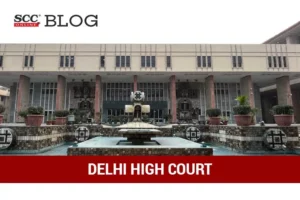Delhi High Court: In a case wherein registration to the device mark
Background
In the present case, an appeal was filed against the order passed by the Assistant Registrar in the Registry of Trade Marks, whereby the application filed by the appellant seeking registration of the device mark
The counsel for the appellant also submitted that the trading name “ABU DHABI GLOBAL MARKET” of the appellant had been adopted by the appellant under the Federal Laws of United Arab Emirates (UAE), issued in the name of the President of the UAE, which stated that “a Financial free zone shall be established under the name “Abu Dhabi Global Market”.” The counsel for the respondent submitted that Abu Dhabi was the name of a place and constituted the most prominent part of the
Analysis, Law, and Decision
The Court noted that the impugned order had rejected the appellant’s application on the following grounds:
1. The
2. The appellant had failed to establish distinctiveness by filing an affidavit of evidence of use.
3. Abu Dhabi was a geographical name and the capital of the UAE.
The Court observed that first sentence of the impugned order read as “9(1)(a)-The attorney failed to establish the Identity of the mark in applied class” and opined that “the Court had no idea as to what this sentence was intended to convey and as the sentence was incomprehensible, it could not obviously serve as a ground to reject the appellant’s application”. The Court noted that the grounds on which registration of a trade mark could be refused were contained in Sections 9 and 11 of the Act, which were comprehensive and exhaustive in that regard and thus, opined that, in the said provisions there was not any requirement of a mark being “coined” or “inventive” for it to be eligible for registration. The Court further opined that “distinctiveness was, undoubtedly, a pre-requisite for registration of a mark, but inventiveness was not. Inventiveness was required for registration of a design or a patent, under the Designs Act, 2000 and the Patents Act, 1970, respectively and there was no corresponding provision in the Trade Marks Act”. Thus, the Court held that the Assistant Registrar could not, therefore, refuse to register the
The Court stated that the link Assistant Registrar seeks to forge between distinctiveness and evidence of use was in teeth of Section 9(1)(a) of the Act, which defined “distinctiveness” as capability “of distinguishing the goods and services of one person from those of another person” and the Court noted that there was no observation or any finding, in the impugned order, that the
The Court noted that the composite marks were excluded from the scope of Section 9(1)(b) of the Act, even if part of such marks consisted of marks or indications which served, in trade, to designate the geographical origin of the goods or services in respect of which the mark was registered. The Court thus opined that “the
The Court expressed its unhappiness at the way the Assistant Registrar had discharged her duties in the present case and opined that the least the officer adjudicating the application could do, was to extend the bare courtesy of application of mind, as in the present case, there was complete abdication, by the Assistant Registrar of the quasi-judicial functions vested in her by the Trade Marks Act and the Trade Marks Rules.
[Abu Dhabi Global Market v. The Registrar of Trade Marks, Delhi, 2023 SCC OnLine Del 2947, decided on 18-5-2023]
Advocates who appeared in this case :
For the Appellant: Arjun Khurana, Lalltaksh Joshi, Advocates;
For the Respondent: Harish Vaidyanathan Shankar, CGSC; Srish Kumar Mishra, Sagar Mehlawat, Alexander Mathai Paikaday, Advocates.
*Judgment authored by: Justice C. Hari Shankar

